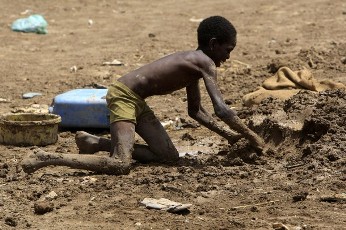Opposition party says Sudan’s NCP using poverty & unemployment as weapons against people
March 9, 2013 (KHARTOUM) – The National Umma Party (NUP) of al-Sadiq al-Mahdi rapped the ruling National Congress Party (NCP) saying that its policies led to propagation of poverty across Sudan.
 Nageeb al-Khair Abdel-Wahab, the NUP spokesperson, said that the NCP has dragged its feet on creating an anti-poverty strategy which was part of the stipulations of the 2000 Millennium Development Goals.
Nageeb al-Khair Abdel-Wahab, the NUP spokesperson, said that the NCP has dragged its feet on creating an anti-poverty strategy which was part of the stipulations of the 2000 Millennium Development Goals.
The NUP official said that developing countries such as Sudan were required to craft plans to combat poverty while rich countries were to assist in executing them so that poverty and hunger are eliminated by 2015.
Abdel-Wahab said it is regretful that the inflation rate has topped 46% while unemployment numbers exceeded 28% of the population.
Because Sudan lost access to the south’s oil resources following the country’s breakup in 2011, its coffers started to dry up and the government was forced to adopt austerity policies last year that involved raising taxes, cutting fuel subsidies and reducing spending.
Furthermore, Sudan moved to curb imports and devalue currency in attempt to prevent further depletion of foreign exchange reserves.
The lost crude accounted for most of Khartoum’s export earnings and half of its fiscal revenues.
A report released by the World Bank last year blamed the government for the grim economic situation saying it “has its roots in the unbalanced policies of the oil boom period” of 1999-2010.
Abdel-Wahab pointed out that the government’s foreign policy resulted in undermining ties Sudan had with international financial bodiessuch as the International Monetary Fund (IMF) and World Bank (WB) as well as the European Union (EU). He noted that Sudan had a missed opportunity in the U.S. African Growth and Opportunity Act (AGOA).
The NCP spokesman stressed that Sudan with its vast human and natural resources should not have been in this dire economic crisis if it weren’t for the government’s reckless spending on wars and political bribery.
He added that the country’s foreign and economic policies are in the hands of people who lack the expertise and capabilities needed to carry out these onerous responsibilities.
(ST)
